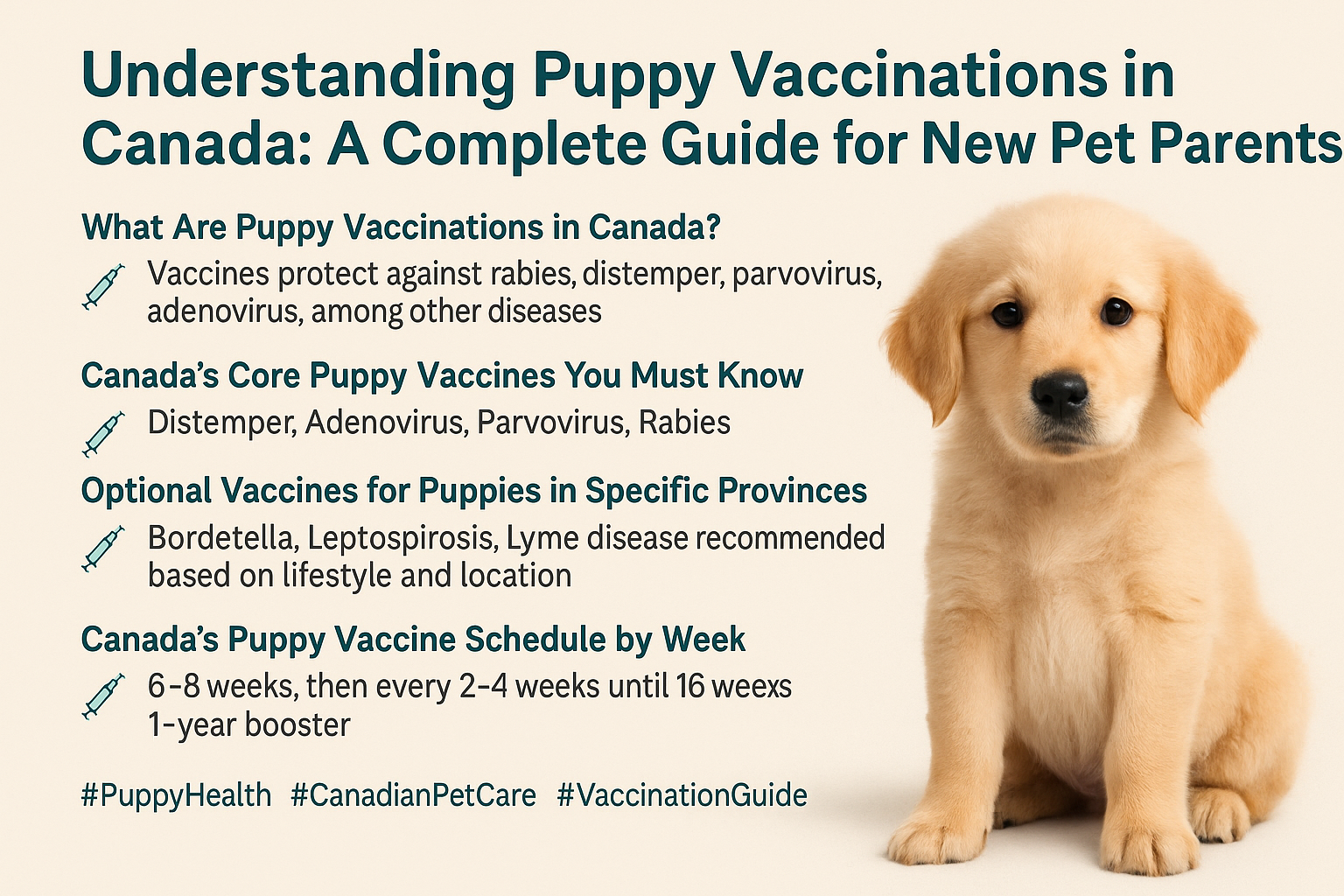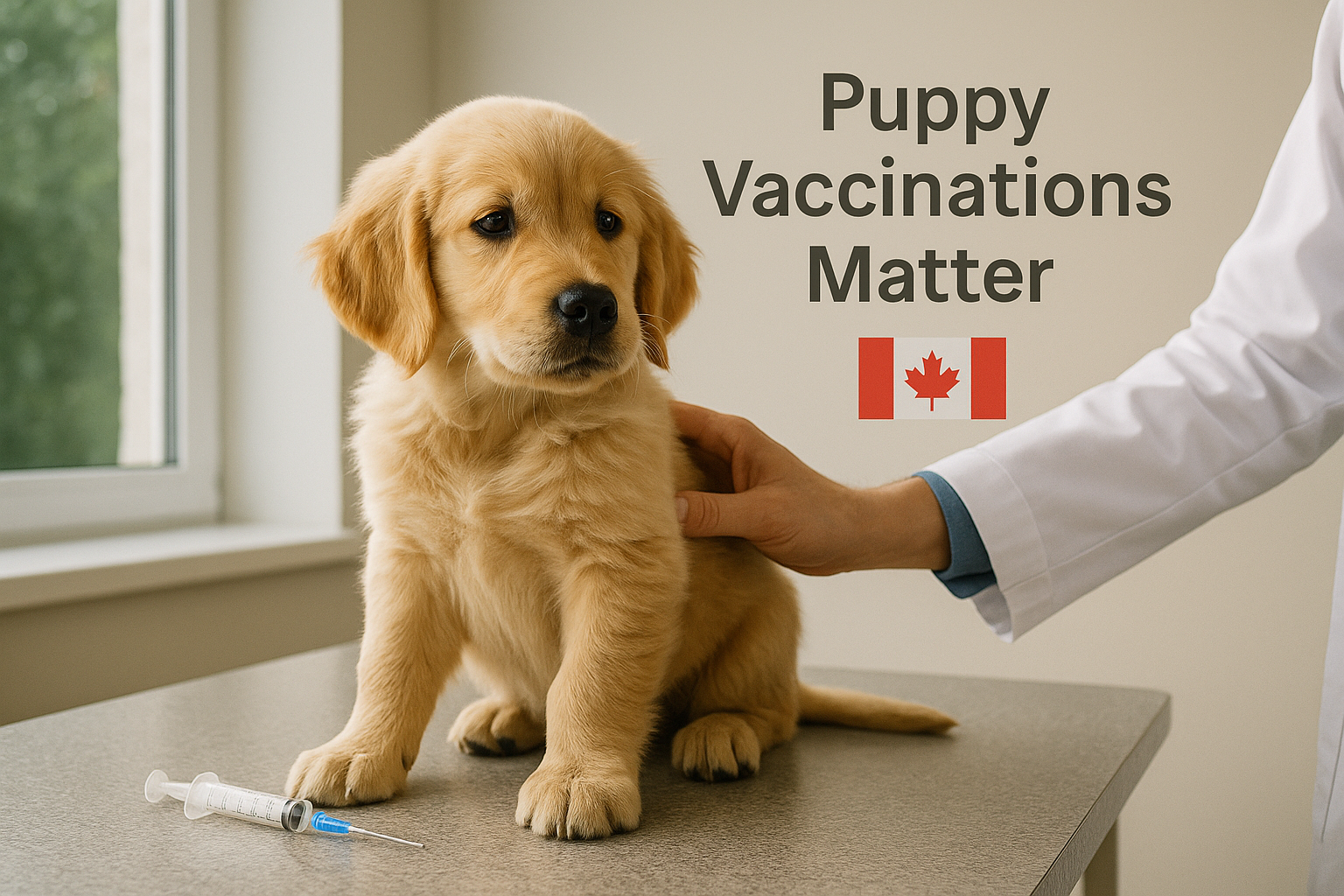What Are Puppy Vaccinations in Canada?
Bringing home a new puppy is an exciting milestone filled with cuddles, playtime, and countless photo opportunities. Amid the joy of welcoming your furry family member, there’s an important responsibility that shouldn’t be overlooked: ensuring your puppy receives proper vaccinations.
Vaccines are essential safeguards that protect your puppy from potentially devastating diseases while contributing to the overall health of pet communities across Canada. But for many first-time pet parents, navigating the world of puppy vaccinations can feel overwhelming.
What shots does your puppy actually need? When should they get them? Do requirements vary across different Canadian provinces? And what about those “optional” vaccines your vet keeps mentioning?
In this comprehensive guide, we’ll demystify puppy vaccinations in Canada, empowering you to make informed decisions about your new companion’s health. Let’s set your puppy up for a lifetime of wellness!
Why Puppy Vaccinations Matter: The Foundation of Preventative Care
Before diving into the specifics, let’s understand why vaccinations are critical for your puppy’s wellbeing.
Puppies are born with some immunity passed from their mother, but this protection is temporary and begins fading between 6-12 weeks of age. This creates a vulnerable window where your puppy becomes susceptible to serious infectious diseases.
Vaccines work by stimulating your puppy’s immune system to recognize and fight specific disease-causing organisms, effectively mimicking an infection without causing the actual disease. This prepares your puppy’s body to defend itself if exposed to the real pathogen in the future.
Beyond protecting your individual puppy, vaccinations contribute to herd immunity—when enough animals in a population are vaccinated, the spread of contagious diseases decreases dramatically, protecting vulnerable pets who can’t be vaccinated due to age or health conditions.
Core vs. Non-Core Vaccines: Understanding What Your Puppy Truly Needs
Not all vaccines are created equal. In Canada, veterinarians categorize canine vaccines into two main groups: core and non-core.
Core Vaccines: Essential Protection for Every Canadian Puppy
Core vaccines protect against widespread, dangerous diseases that pose a significant risk to all dogs regardless of their lifestyle or location. These vaccines are recommended for every puppy in Canada without exception.
The core vaccines for Canadian puppies include:
-
Distemper: This highly contagious viral disease attacks the respiratory, gastrointestinal, and nervous systems. Without vaccination, distemper has a mortality rate of approximately 50% in adult dogs and even higher in puppies.
-
Adenovirus (Canine Hepatitis): This virus targets the liver, kidneys, and blood vessel linings. Severe cases can be fatal, while survivors may suffer from “blue eye”—a clouding of the cornea.
-
Parvovirus: Infamous for its devastating impact on puppies, parvo causes severe, often bloody diarrhea, vomiting, and extreme lethargy. Without intensive treatment, the mortality rate in puppies can exceed 90%.
-
Rabies: This fatal viral disease affects the central nervous system and is transmissible to humans. Due to its public health significance, rabies vaccination is legally mandated throughout most of Canada.
These core vaccines are typically combined into a single shot (except rabies), commonly referred to as the DHPP vaccine (Distemper, Hepatitis, Parvovirus, Parainfluenza).
Non-Core Vaccines: Tailored Protection Based on Lifestyle Risks
Non-core vaccines protect against diseases that only pose a risk to puppies in specific circumstances, depending on geographical location, environment, and lifestyle factors. Your veterinarian will assess your puppy’s individual risk profile to recommend appropriate non-core vaccines.
Common non-core vaccines in Canada include:
-
Bordetella (Kennel Cough): Recommended for puppies who will attend training classes, doggy daycare, boarding facilities, or frequently visit dog parks. This vaccine protects against a common respiratory infection that spreads rapidly in places where dogs congregate.
-
Leptospirosis: This bacterial infection can cause liver and kidney damage and is spread through the urine of infected wildlife and livestock. Dogs who spend time outdoors, especially near lakes, rivers, or in rural areas, may benefit from this vaccine.
-
Lyme Disease: Transmitted by ticks, Lyme disease is prevalent in certain regions of Canada, particularly southern Ontario, Manitoba, Quebec, and parts of British Columbia. Dogs who frequent wooded areas in these regions may need this vaccine.
-
Canine Influenza: This respiratory infection can spread rapidly in settings where dogs gather. It’s relatively new to Canada but may be recommended if your puppy will travel or attend events with many other dogs.
Remember, “non-core” doesn’t mean “unnecessary”—it simply means the necessity depends on your puppy’s specific risk factors. Have an open conversation with your veterinarian about your puppy’s lifestyle to determine which non-core vaccines make sense for your furry friend.

The Canadian Puppy Vaccination Schedule: Timing is Everything
Vaccine timing is crucial for building appropriate immunity in your growing puppy. In Canada, veterinarians typically follow this general schedule:
6-8 Weeks of Age
- First DHPP vaccine (Distemper, Hepatitis, Parvovirus, Parainfluenza)
- Possibly Bordetella if the puppy will attend puppy classes
10-12 Weeks of Age
- Second DHPP vaccine
- First Leptospirosis (if recommended)
- First Lyme disease vaccine (if recommended in your region)
14-16 Weeks of Age
- Third DHPP vaccine
- Second Leptospirosis (if recommended)
- Second Lyme disease vaccine (if recommended)
16-20 Weeks of Age
- Rabies vaccine (mandatory in most provinces)
1 Year of Age
- DHPP booster
- Rabies booster
- Boosters for any non-core vaccines
Adult Maintenance
- DHPP boosters every 1-3 years (depending on the vaccine used)
- Rabies boosters every 1-3 years (according to provincial regulations)
- Annual boosters for non-core vaccines as needed
This timeline may vary slightly based on your puppy’s health status, your location in Canada, and your veterinarian’s professional judgment. The important thing is maintaining the recommended intervals between shots to ensure proper immunity development.
Provincial Variations: Navigating Regional Requirements Across Canada
While the fundamental vaccination recommendations remain consistent throughout Canada, there are some provincial differences worth noting—particularly regarding rabies vaccination requirements.
Ontario
Ontario has strict rabies vaccination laws. Dogs must receive their first rabies vaccine by three months of age, with a booster one year later, and then every 1-3 years depending on the vaccine used.
British Columbia
BC requires rabies vaccination for dogs in most municipalities, typically beginning at 12-16 weeks of age. Some coastal communities may place greater emphasis on Leptospirosis vaccination due to wetter conditions.
Alberta
Alberta strongly recommends rabies vaccination but doesn’t mandate it province-wide (though some municipalities do). Areas bordering wilderness may have stronger recommendations for Leptospirosis and Lyme disease vaccines.
Quebec
Quebec requires rabies vaccination for dogs. The province has seen increasing cases of Lyme disease in recent years, so this non-core vaccine is often recommended in many regions.
Atlantic Provinces
Rabies vaccination is highly recommended or required throughout Nova Scotia, New Brunswick, Prince Edward Island, and Newfoundland. These provinces may emphasize Leptospirosis vaccination due to the prevalence of wetlands.
Northern Territories
In Yukon, Northwest Territories, and Nunavut, rabies vaccination is especially important due to the presence of rabies in wildlife populations. Veterinarians in these regions may tailor vaccination programs to account for unique northern disease risks.
Regardless of provincial variations, following your local veterinarian’s recommendations is the best approach, as they’ll be familiar with region-specific concerns and requirements.
Beyond Vaccinations: Comprehensive Puppy Health Care
While vaccinations form a crucial pillar of preventative care, they’re just one component of keeping your puppy healthy. A holistic approach to puppy healthcare includes:
Regular Veterinary Check-ups
Schedule wellness exams every 3-4 months during your puppy’s first year, then annually or bi-annually thereafter. These visits allow your vet to monitor growth, development, and detect any emerging health concerns.
Proper Nutrition
Feed a high-quality puppy food formulated for your dog’s size and expected adult weight. Puppies have different nutritional needs than adult dogs, requiring more calories, protein, and certain minerals to support healthy growth.
Safe Socialization
After your puppy has received their initial vaccines (usually around 10-12 weeks), begin introducing them to new environments, people, and friendly, vaccinated dogs. This critical socialization period helps develop a confident, well-adjusted adult dog.
Parasite Prevention
Work with your veterinarian to establish an effective deworming protocol and flea/tick prevention regimen. In Canada, heartworm prevention is also recommended during warmer months, particularly in southern regions.
Exercise and Mental Stimulation
Provide appropriate physical activity for your puppy’s age and breed, along with enrichment activities that challenge their developing brain. Be careful not to over-exercise, as growing joints are susceptible to injury.
Dental Care
Begin a dental hygiene routine early by gently introducing toothbrushing. Dental disease is incredibly common in adult dogs, and prevention starts in puppyhood.
By addressing all these aspects of puppy healthcare alongside vaccinations, you’re setting your furry friend up for a lifetime of optimal health.
Common Questions About Puppy Vaccinations
New pet parents often have concerns about vaccinations. Here are evidence-based answers to frequently asked questions:
Can my puppy socialize before completing all vaccinations?
While you should avoid high-risk areas like dog parks until your puppy is fully vaccinated, controlled socialization with known, healthy, vaccinated dogs is generally considered safe and beneficial. Puppy socialization classes that verify vaccination status are also excellent options.
Can vaccines make my puppy sick?
Mild lethargy, reduced appetite, or soreness at the injection site are normal and temporary reactions. Severe reactions are extremely rare. The protective benefits of vaccines far outweigh these minor and short-lived side effects.
Is it possible to over-vaccinate my puppy?
Modern veterinary medicine aims to provide optimal protection while minimizing unnecessary vaccinations. This is why many vaccines now have 3-year durations and why veterinarians assess lifestyle risks before recommending non-core vaccines.
What if we miss a scheduled vaccination?
If you miss a scheduled vaccine, contact your veterinarian promptly. Depending on how much time has passed, they may recommend restarting the series or simply continuing from where you left off.
Should I vaccinate a puppy who will primarily stay indoors?
Yes, absolutely. Even predominantly indoor dogs can be exposed to infectious diseases. Core vaccines protect against diseases that can be carried on your shoes, clothing, or by visiting humans.
Working With Your Canadian Veterinarian: Building a Partnership
Your veterinarian is your most valuable ally in navigating puppy healthcare decisions. Here’s how to make the most of this partnership:
-
Come prepared with questions. Write down your concerns before appointments so you don’t forget important topics you want to discuss.
-
Share lifestyle details. Your vet needs to know if your puppy will be hiking in the woods, attending doggy daycare, or primarily relaxing at home to make appropriate vaccine recommendations.
-
Discuss cost concerns openly. If vaccination costs are challenging, ask about wellness plans or payment options rather than skipping essential preventative care.
-
Report any adverse reactions. If your puppy experiences anything unusual after vaccination, document it and notify your veterinarian immediately.
-
Keep detailed records. Maintain a vaccination booklet or digital record of all your puppy’s preventative care, which will be invaluable if you change veterinarians or need boarding services.
Conclusion: A Healthy Start for a Lifetime of Happiness
Navigating puppy vaccinations is one of the first and most important ways you can protect your new family member. By understanding the difference between core and non-core vaccines, following the recommended Canadian vaccination schedule, and acknowledging provincial variations, you’re taking crucial steps toward ensuring your puppy’s long-term health.
Remember that vaccinations are just one component of comprehensive preventative care. Working closely with your veterinarian to address all aspects of your puppy’s health—from nutrition and parasite prevention to dental care and appropriate exercise—will help your puppy develop into a healthy, happy adult dog.
The time and resources you invest in preventative healthcare during these formative months will pay dividends throughout your puppy’s life, potentially saving you from costly treatments for preventable diseases while giving your canine companion the best chance at a long, vibrant life by your side.
Your puppy relies on you to make the best healthcare decisions on their behalf. With the information in this guide and the expertise of your veterinarian, you’re well-equipped to provide the protection your new furry family member deserves.
#PuppyHealth #CanadianPetCare #VaccinationGuide


